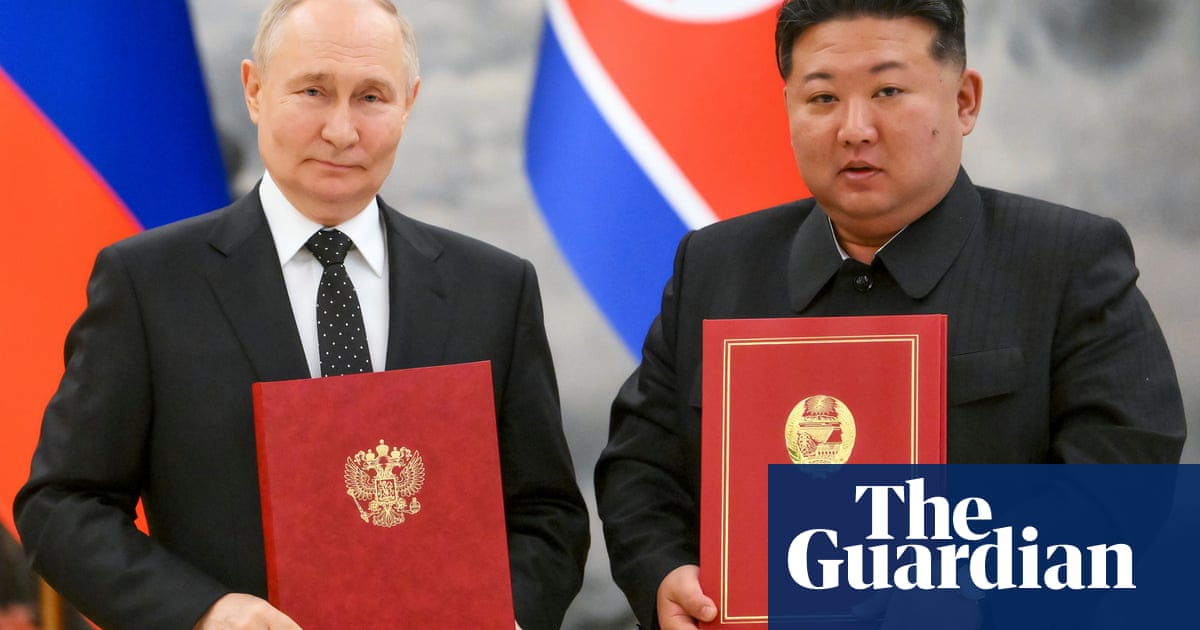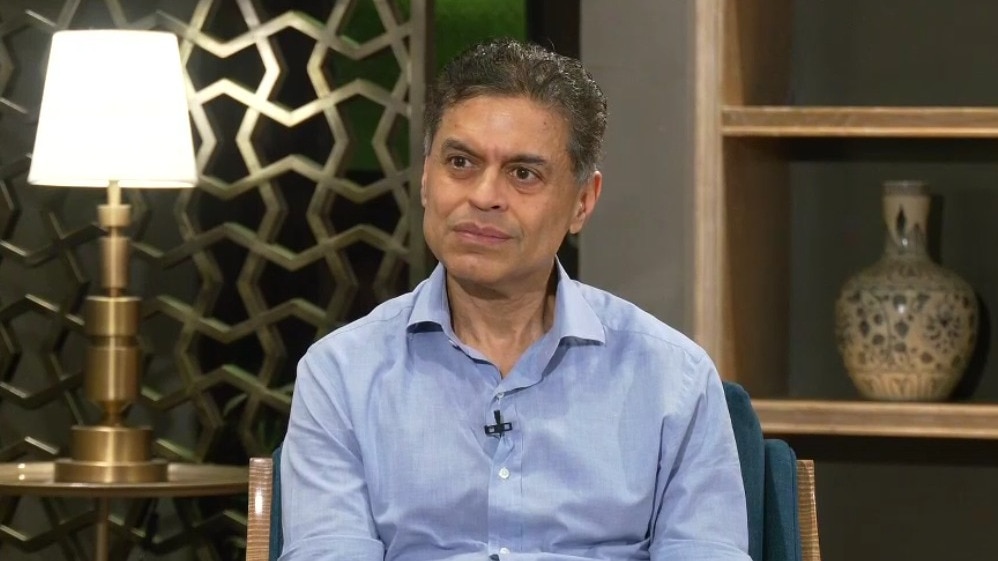Australia to donate 49 Abrams tanks to Ukraine

Daniel Hurst
Australia will donate 49 Abrams tanks to Ukraine, the federal government has announced.
The donation is in addition to previously announced support, which included 120 Bushmaster protected mobility vehicles.
Government figures indicate the value of the 49 M1A1 Abrams tanks is about $245m in total. It means that the total value of Australia’s military assistance to Ukraine since the start of Russia’s full-scale invasion of the country has topped $1.3bn. When non-military support is included, Australia’s overall support to Ukraine is valued at $1.5bn to date.
The minister for defence industry, Pat Conroy, will represent Australia at the Nato defence ministers’ meeting in Brussels this week. Australia is not a member of Nato but Conroy is expected to meet with his Ukrainian counterpart.

Conroy said in a statement that the tanks would “deliver more firepower and mobility to the Ukrainian armed forces, and complement the support provided by our partners for Ukraine”.
The 49 tanks to be donated are near the end of their life. Sources said this meant that a small number of these tanks may need to be fixed by Australia before being delivered. Alternatively, the Australian government has offered to deliver all of the tanks quickly and Ukraine could use the ones with issues for spare parts. It will be left to Ukraine to decide which option to take up.
The Australian army, meanwhile, is expected to retain a small number of M1A1 Abrams tanks to assist the transition and introduction of the new M1A2 fleet.
The defence minister, Richard Marles, said:
Australia’s support for Ukraine has not wavered since Russia’s illegal invasion, and Australia will continue standing with Ukraine.
Key events Show key events only Please turn on JavaScript to use this feature
Richard Marles on donation of tanks to Ukraine
The deputy prime minister and defence minister, Richard Marles, was on ABC News Breakfast earlier and also spoke to the donation of 49 Abram tanks to Ukraine. He said:
We know this will be a conflict that goes for a long time. We are in there for the long haul. This will not be the last package that we provide to Ukraine, as we have consistently said. And we’ll stand with Ukraine for as long as it takes for Ukraine to resolve its conflicts on its own terms.
Asked about concerns that Donald Trump may reduce support for Ukraine if elected as US president, Marles said “there’s a lot at stake.”
We cannot allow to stand the idea that a large country can invade a smaller nation, not by reference to international law but reference to power and might. We stand with the international community in terms of supporting Ukraine, and we’ll continue to do that. And obviously, what plays out in America is a matter for the American people. But it really matters that the global community continue to support Ukraine in its fight.

Conroy provides more detail on donation of 49 Abram tanks to Ukraine
The defence industry minister, Pat Conroy, has been speaking with ABC RN after the announcement Australia would donate 49 Abrams tanks to Ukraine. You can read more about this earlier in the blog from Daniel Hurst, here.
Asked what changed, after the Albanese government initially indicated a donation wouldn’t occur, Conroy said:
We were talking with the Ukrainian government about their priorities and they made clear this is one of their priorities … Another important factor was the delivery of our new M1A2 tanks beginning in the middle of this year that free up these tanks to be released to Ukraine.
So this is part of a broader process, and there are other checks and balances – including support from the United States – for the transfer of this equipment.
Conroy couldn’t disclose when the tanks would be delivered due to “operational security”. Asked if the tanks were safe for use, he said Australia was talking with Ukraine about whether “some of these tanks will require some modifications to be fixed for battlefield”.
We’ve made it very clear that we’re unwavering in our support for the people of Ukraine in the face of Russia’s unprovoked and illegal war, and we’ve made it very clear that we’ll be supporting Ukraine as long as it takes for them to end the war on their terms and to maintain pressure on Russia.
People held on Nauru moved into community, struggling with everyday costs
Caseworkers with the Asylum Seeker Resource Centre say the “majority” of people held in closed detention on Nauru have recently been moved into the community – however are struggling with the cost of everyday essentials.
According to a statement from the ASRC, those in the community are allocated $230 per fortnight to survive on. About 39 people are living in “a complex similar to a detention centre and must share one small, office-sized kitchen”, the centre said, while transportation is posing a barrier for those in more remote areas.
The ASRC is calling on the government to urgently evacuate all people held on Nauru for medical care and support while they wait for protection claims to be processed. Its deputy chief executive, Jana Favero, said:
People should never have been sent to Nauru in the first place … The harm of offshore detention is well documented and will continue until we stop outsourcing our moral responsibility and honour our refugee convention obligations.

Mohammad Bashir Anjum, who is currently held on Nauru, said “our mental health is not good and we rely on medicines to live our daily life”.
There is no certainty about the future and what may happen to us. With the small financial allowance no one can afford three meals a day … We have spoken to authorities to request an increase in the financial allowance, and our requests were ignored.
You can read more on this, from June, below:
Supermarkets 'public enemy No 1' in cost of living crisis, according to survey
New polling from the Australia Institute shows that Australians view the supermarkets as “public enemy No 1” in the cost of living crisis.
The Australia Institute’s Centre for Future Work surveyed 1,014 voters, and 83% said supermarkets deserve some blame – or a great deal of blame – for the soaring cost of living.
It puts the supermarkets ahead of energy companies on 82%, banks at 73%, and the government on 71%. Sixty per cent of voters said groceries had the most notable cost increase – far ahead of the next highest result of utilities at 21%.
Sixty-four per cent said they supported increasing supermarket competition. Centre For Future Work senior researcher and report co-author Lisa Heap said the results were “emphatic.”
Australians are pointing the finger squarely at supermarkets as public enemy No 1 in the cost-of-living crisis … More people blame supermarkets for the cost-of-living crunch than governments or banks.
The public’s appetite for increased supermarket competition is unmistakable. Nearly two-thirds of voters see it as crucial for alleviating cost-of-living pressures … There’s likely to be political rewards for taking actions that increase supermarket competition.
The cost of living crisis means people are spending less on essential services, the survey also found, with 37% spending less on heating/cooling their home, 29% spending less on healthy food and 26% less on seeing a doctor.

King Charles to arrive in Australia tomorrow
Tomorrow, King Charles will touch down in Australia. The six-day tour will take in Sydney and Canberra and is the first visit by a sitting monarch in 13 years. But not everyone is excited.
Reporter Kate Lyons tells Matilda Boseley how the King’s visit has reignited the republic debate – even if the government seems to have given up on the idea.

Commonwealth Bank pays $7.5m fine over spam emails

Josh Taylor
Commonwealth Bank has paid a $7.5m fine after the Australian Communications and Media Authority (Acma) found the bank had sent over 170m emails that did not comply with Australian spam laws.
The Acma investigation found that between November 2022 and April 2024, CBA had sent over 170m marketing messages to Australians that did not include a way to unsubscribe. Acma found that 34.8m of these messages were also sent to people who either had not consented or had withdrawn their consent to receive these messages.
It follows a $3.55m fine against CBA in May last year over 65m emails that did not have working unsubscribe arrangements. Acma chair, Nerida O’Loughlin, said:
Australians are sick and tired of this kind of spam intruding on their privacy and it’s clear CBA did not have its systems in order.
The rules are clear, if a message includes marketing content or direct links to marketing content, it is a commercial message and must give people the option to unsubscribe.

The confusion often lies for businesses in whether messages sent to customers are considered commercial (which would require an unsubscribe option) or non-commercial.
Acma has also accepted a three-year court-enforceable undertaking from CBA to address the issues. A spokesperson for CBA said the bank apologised for sending the non-compliant messages, and accepted the findings of the investigation:
Timely and relevant information for our customers is incredibly important, and the way we classify that information to meet our regulatory requirements and customer expectations is an absolute priority. We are committed to meeting our obligations and we’re dedicating significant time and resources to this.

Sarah Basford Canales
More on the joint union’s statement
Yesterday’s rift between trade union factions coincided with a forum between building and construction contractors and unions and governments on challenges for the sector.
At yesterday’s meeting, the Construction Industry Forum agreed to develop a blueprint for reform due to be delivered in six months’ time.
The workplace relations minister, Murray Watt, said “working together to address the persistent challenges facing this industry is key to ensuring it is an industry that works for everyone”.
Watt later told ABC radio he didn’t believe there was a divide in the trade union movement at all. Watt said:
There is no doubt whatsoever that the overwhelming majority of unions and union members support action being taken to clean up the CFMEU. I think that the union movement generally acknowledges that it has been very damaging for the union movement as a whole to have a small number of people within the union movement bring disgrace on the union movement and the very good work that unions do for Australians.

Asked whether the split would present issues with the federal government’s reform, Watt said he was “going to get on with it”.
We’re going to get on with cleaning up the CFMEU Construction Division and developing a construction industry that works for everyone. If other people want to go and have other meetings, that’s fine. But I’m more convinced than ever, having spoken to the ACTU national executive, that the union movement supports change.
Group of 20 unions defy Albanese overhaul

Sarah Basford Canales
A group of more than 20 trade unions have defied the Albanese government’s attempts to overhaul unions within the construction industry after allegations of corruption and criminal links made against the CFMEU earlier this year.
Yesterday afternoon, the Building Industry Group of Unions condemned the federal Labor government for placing the embattled union under administration.
In a statement, the group said the CFMEU had been denied “basic natural justice” in a trial by parliament and the media. The statement continued:
If a government can legislate outcomes for one union, then all unions are at risk. A union belongs to its members. Union members and their democratically elected leaders decide the future of their union, not knee-jerk legislation.
The group, which includes leaders from the CFMEU, and the Communications, Electrical and Plumbing Union (CEPU), will hold a Trade Unions for Democracy Summit in December to discuss proposals for the creation of an alternative to the Australian Council of Trade Unions (ACTU), which has backed the government’s response to allegations against to the CFMEU.

Good morning

Emily Wind
And happy Thursday – thanks to Martin for kicking things off for us. I’m Emily Wind, and I’ll be taking you through our rolling coverage today.
As always, you can reach out with any tips or questions via X, @emilywindwrites, or you can send me an email: emily.wind@theguardian.com.
Crossbenchers to bring whistleblower protection bill next month

Sarah Basford Canales
Four independent crossbenchers will introduce a bill to establish a whistleblower protection authority when Parliament resumes next month.
Tasmanian MP Andrew Wilkie will introduce the proposal, supported by crossbench colleagues Helen Haines, David Pocock and Jacqui Lambie, to create a new body that will support federal whistleblowers, investigate potential retaliation by employers, and ensure disclosures are properly handled.
The private member’s bill will come almost a year-and-half after the Anti-Corruption Commission first opened its doors, and more than a year after the attorney general, Mark Dreyfus, confirmed a protection body was one of a number of options under consideration.
Dreyfus has previously said the government is “committed to ensuring that Australia has effective protections for whistleblowers”.
But Wilkie said the introduction of a standalone protection body was “long overdue”.
The government must end the war against whistleblowers by supporting my bill. Only then can we ensure whistleblowers are protected, not punished, prosecuted or imprisoned.
The crossbenchers are urging the major parties to support the bill.
The announcement coincides with a hearing in the ACT supreme court this morning to determine when former army lawyer David McBride – who is considered by some to be a war crimes whistleblower – will be able to have his appeal heard.
McBride was jailed in May for five years and eight months after pleading guilty to three charges in November 2023 of stealing commonwealth information and passing that to journalists at the ABC.
The documents formed the basis of the 2017 investigative series exposing alleged war crimes by Australian defence force personnel in Afghanistan, titled the Afghan Files.
BCA says changing zoning laws will open up housing supply

Karen Middleton
Big business is urging the federal government to change zoning laws to allow more housing development close to infrastructure and services as part of a push to force a greater focus on increasing housing supply.
Before publishing a report next week examining the housing supply challenge, the Business Council of Australia has proposed a program of land rezoning and changes to generate greater consistency in zoning laws across the states and territories.
The BCA chief executive, Bran Black, said:
We need state and territory governments to unlock more land for homes in cities and towns across Australia so we can fix this supply crisis.
These changes need to allow for greater density and height near good transport services, while at the same time protecting the quality of life, green space and heritage of an area.

He said there should be more streamlined processes for home builders to put forward their own proposals to boost housing supply thorough rezoning.
The BCA is also calling for what it describes as a “competition payment” to create incentives for housing development.
Earlier this week, the BCA called for local councils to be forced to set, and abide by, deadlines for making decisions on housing development applications, to ease what it argued had become a bottleneck at the local government level.
Australia to donate 49 Abrams tanks to Ukraine

Daniel Hurst
Australia will donate 49 Abrams tanks to Ukraine, the federal government has announced.
The donation is in addition to previously announced support, which included 120 Bushmaster protected mobility vehicles.
Government figures indicate the value of the 49 M1A1 Abrams tanks is about $245m in total. It means that the total value of Australia’s military assistance to Ukraine since the start of Russia’s full-scale invasion of the country has topped $1.3bn. When non-military support is included, Australia’s overall support to Ukraine is valued at $1.5bn to date.
The minister for defence industry, Pat Conroy, will represent Australia at the Nato defence ministers’ meeting in Brussels this week. Australia is not a member of Nato but Conroy is expected to meet with his Ukrainian counterpart.

Conroy said in a statement that the tanks would “deliver more firepower and mobility to the Ukrainian armed forces, and complement the support provided by our partners for Ukraine”.
The 49 tanks to be donated are near the end of their life. Sources said this meant that a small number of these tanks may need to be fixed by Australia before being delivered. Alternatively, the Australian government has offered to deliver all of the tanks quickly and Ukraine could use the ones with issues for spare parts. It will be left to Ukraine to decide which option to take up.
The Australian army, meanwhile, is expected to retain a small number of M1A1 Abrams tanks to assist the transition and introduction of the new M1A2 fleet.
The defence minister, Richard Marles, said:
Australia’s support for Ukraine has not wavered since Russia’s illegal invasion, and Australia will continue standing with Ukraine.
Welcome
Good morning and welcome to our live news blog. I’m Martin Farrer with the top overnight stories and then it’ll be Emily Wind.
In a boost to Ukraine’s war effort – as its president presents a new military strategy dubbed a “victory plan” against Russia – Australia has offered Ukraine almost all of its Abrams tanks, which were due to retire next year. More on this soon.
The South Australian bill to change the law on later terminations was narrowly defeated in the state’s upper house last night. By the narrowest margin of 10 votes to nine, the upper house last night voted to reject legislation that would force women seeking an abortion after 27 weeks and six days – an extremely rare occurrence – to be induced, to deliver the child alive, and keep it or adopt it out.
Anthony Albanese may face renewed backbench pressure to ease capital gains tax concessions, as Labor MPs privately express dismay at his decision to buy a $4.3m waterfront home on the New South Wales Central Coast before an election in the middle of a housing crisis. Meanwhile, big business is urging the federal government to change zoning laws to allow more housing development close to infrastructure and services as part of a push to force a greater focus on increasing housing supply. More coming up.
The most prominent republicans concede the challenges they face to have an Australian head of state, but also claim the arrival this week of King Charles and Queen Camilla may be the shot in the arm their campaign needs. We have a full report and analysis, plus our Full Story podcast on the subject.
And a group of building industry unions say they plan an alternative to the ACTU as they unite to reject Labor’s crackdown on the CFMEU. More on that also coming up.

 1 month ago
1 month ago


















